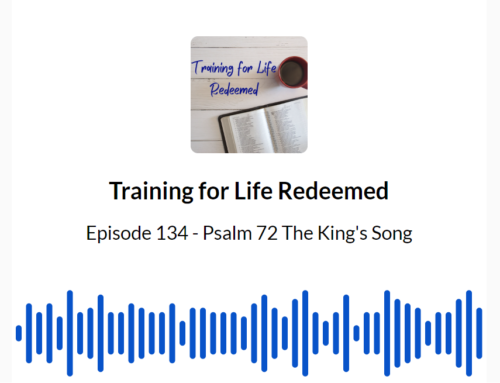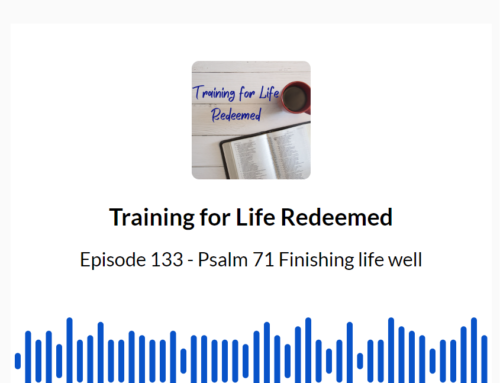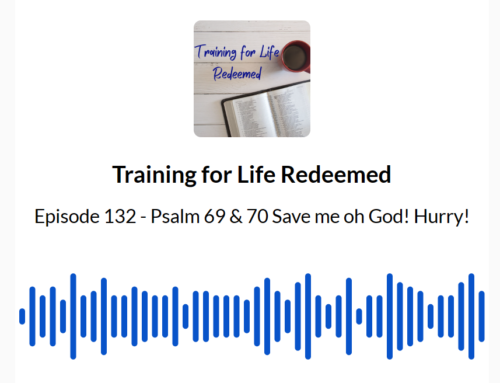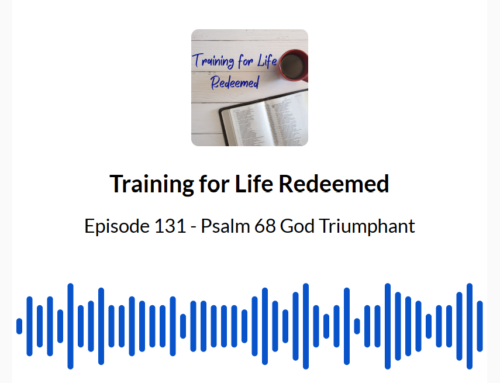Grab your notes for this episode by completing the form
and we will send you the link to all our notes.
THE BOOK OF PSALMS
I have been accustomed to call this book, I think not inappropriately, “An Anatomy of all the Parts of the Soul” for there is not an emotion of which any one can be conscious that is not here represented as in a mirror.
It is by perusing these inspired compositions, that men will be most effectually awakened to a sense of their maladies, and, at the same time, instructed in seeking remedies for their cure. In a word, whatever may serve to encourage us when we are about to pray to God is taught us in this book.[1]
Emotions are weird. When my dad died I felt nothing. That bothered me enormously. I arrived in time to close his eyes and break the news to my mum and sister. I focused on what had to be done. Several days after the funeral I came in from mowing the lawn. It was hot. I had a beer.[2] Then the volcano erupted. Out of nowhere I was bawling uncontrollably. I gripped the table because I wanted to smash something. It was a rage, not just a sadness. It passed and I was exhausted.
When Jesus stood in front of Lazarus’s tomb he had the same experience. We read that Jesus boiled, raged, and bawled. [3] Even though he knew he would raise Lazarus in a few minutes, his emotional reaction to death was overwhelming.
We are complex creatures imaging our Creator. We experience a sphere of emotions, many at the same time. They range in intensity. We struggle to control and to express them.
Some of our emotions are wrong. They are driven by wrong assumptions, wrong beliefs, and wrong thinking. They can be powerfully damaging and hurtful. There is a reason that we are fearful of our emotions.
When we train for life we tend to focus on head, hands and feet. That is to say, we work on knowledge and life skills. But deep down inside is the heart. How do you train your heart? How do we grow godly emotions and get rid of those that are destructive?
A major part of God’s answer is the Book of Psalms and all the other songs that he has embedded in the Scriptures.
When we go to church we sing songs. Mostly they are happy songs. People sometimes refer to this as “a time of praise and worship” or just “worship.” But worship is way more than that.
Worship is all of life. We are Christ’s servants. Every minute of every day is either worship or sin because everything we do is done in our bodies which are His temples. We bear his name and reputation as members of his family.
Jesus redeemed the whole person. That means Jesus redeemed and restored our emotions. That is more complex than “healing a broken heart.” He gave us a new one,[4] and with it a new song.[5] That is why we have the Book of Psalms.
God is not a computer, and people are not machines. God has emotions and people are designed to reflect his character. The Book of Psalms is the tuning fork for our hearts.
Over the centuries Christians have launched the music of nations. From Luther’s parodies of pub songs to church composers like Bach to Afro-American “songs of Canaan,” to Jazz to Rock, we can trace the road along which Jesus has freed us to sing and pour out our hearts. The challenge is to use that freedom to bring peace through Christ rather than to add damage to injustice.
The world’s songs wrestle with the same issues. They rage against the darkness. They assert their so-called freedom. They promote their fantasies. For every one of their songs there is a psalm that reflects the reality of God’s character and grace. We need to listen to the world’s songs through the framework of God’s songs. His songs answer the cries of their hearts aas well as ours.
Why do we Sing?
Music captures thoughts and connects them with the heart. When we sing we pour out our hearts to whoever is listening. Often that means we sing to ourselves when no one else can look in on our hearts. Or we listen to others sing the songs that resonate with our hearts.
It is no coincidence that music and song bond with us between puberty and our twenties. These are the songs we listened to, sang, and danced to when our hearts were ripening and forming. They are responses to the wider culture and our experiences during that time. We go back to “our music” for the rest of our lives. The next generation has their own.
So what do we do with the Book of Psalms?
God in his wisdom gave us the words but not the music. His church crosses all generations and cultures. When the words resonate with our hearts, we produce the music.
The words of these songs are the model of God’s own emotions. God is emotional. We need to picture Jesus as our representative singing these songs as our lead singer. When they nailed him to that cross he announced the song that expressed his heart at that moment – Psalm 22. He could do no more than scream the first line.[6] And then he died. The question in that first line is answered further down in the song.
For he has not despised or detested the suffering of the sufferer
and he has not hidden his face from him.
When he cried to him for rescue, he heard.
From you is my praise in the great congregation.
My vows I will complete before those who fear him.[7]
We sing both to God and to others. It may be to our families around the table or in the car. We sing when we assemble as a church. We might also sing our songs into the face of our enemies. When God’s people were being killed under Queen Mary, crowds of believers gathered and faced off against the soldiers at the place of execution. They sang the psalms and stared those troops down. Those songs encouraged the faithful and rebuked their persecutors. They proclaimed the offer of salvation.
Paul instructed the early church to sing,
Speaking to one another with music, hymns, and spiritual songs, singing and making music in your heart to the Lord giving thanks always for everything in the name of our lord Jesus Christ to God the Father.[8]
The word of Christ is to dwell in you abundantly with all wisdom, teaching and warning each other with music, hymns, spiritual songs, singing with gratitude in your hearts to God.[9]
Singing is a ministry of the word. We are speaking words and conveying meaning to those around us. When we all say the same thing we are expressing our unity and agreement both in what we are saying and in how we feel about what we are saying.
When we sing with others we are teaching and warning. The believer is a trainee. We are new creatures, freed from the bondage of sin and our past. We have to learn to adopt and adapt to our new nature. Paul describes this process as changing clothes. We have to take off the attitudes, emotions, and lifestyle of the past. In its place we have to put on those that reflect the character of God.
What are we Doing When we Sing?
We are tuning our hearts to God’s. A harmonic occurs when two instruments are in tune with each other. If the guitar string is in tune, sounding that note will make the string vibrate and produce the same without touching it. An opera singer can break a glass by singing the note produced by tapping the glass.
A right emotion is one that is in tune with God’s. If he is angry it is inappropriate for us to respond with joy, or even to not care. If he is delighted, then we ought not to be sad. Whether it be happiness or grief, our hearts are to be tuned to his.
Singing forms emotions as well as expressing them. We adopt the attitudes, assumptions, and beliefs of our generation by absorbing its songs. It is a powerful, and subliminal way to form a culture.
I once visited a lady whose husband had left her for another woman after thirty years of marriage. She was devastated. She went into her room and brought out her Bible. She opened it to Psalm 69 and said, “It is as if this song was written about me.” She pointed to these verses:
Save me, O God! For the waters have come up to my neck.
I sink in deep mire, where there is no foothold;
I have come into deep waters, and the flood sweeps over me.
I am weary with my crying out;
My throat is parched.
My eyes grow dim with waiting for my God.[10]
I am the talk of those who sit in the gate,
And the drunkards make songs about me.
But as for me, my prayer is to you, O LORD.
At an acceptable time, O God,
In the abundance of your steadfast love
answer me in your saving faithfulness.
Deliver me from sinking in the mire;
Let me be delivered from my enemies and from the deep waters.[11]
You know my reproach, and my shame and my dishonour;
My foes are all known to you.
Reproaches have broken my heart, so that I am in despair.
I looked for pity, but there was none,
And for comforters, but I found none.[12]
John notes that the next verse in that psalm was fulfilled during the crucifixion of Jesus.[13]
J.B. Phillips served as an Anglican minister in London throughout the horrors of World War 2. He discovered that most adults thought of God in terms that didn’t develop beyond their childhood. The god they believed in was not adequate to deal with the harsh realities of their experience. After the war, in 1952, he produced a cheeky little book entitled Your God is Too Small.[14] On the cover was a picture of things from a child’s nursery. It is easy for a child to assume that God is just some sort of nice imaginary friend.
The songs that resonated with that generation were songs that expressed the weight of their hearts. A favourite among those who went into battle was “Abide with me.”[15] By contrast, without reference to the gospel, in a fantasy of wishful thinking, Vera Lyn sang “We’ll meet again, Don’t know where, Don’t know when.”[16] Songs of war, songs of injustice, songs of lament, are all part of the songs of life. The Book of Psalms has them all. Our God is not too small.
When we gather in our churches we express only a tiny range of safe emotions in our singing. But life is much bigger, and the world needs to hear and learn the songs that see life through the redeemer’s eyes.
For that to happen each generation and every culture needs to compose the music that will express the emotion of these songs for their own communities. And as the people gather to Christ from every nation, tribe, and language, and across multiple generations, we need to hear and share each other’s music and hearts.
[1] Calvin, John. Commentary on the Book of Psalms. Vol. 1, p. xxxvii in Calvin’s Commentaries. Vol 4. (Translated by Arthur Golding, 1571. Reprinted 2003. Grand Rapids: Baker).
[2] See Proverbs 31:6 where the word translated “strong drink” is the word for beer.
[3] John 11:33 – 35.
[4] Ezekiel 18:31; 36:26.
[5] Psalm 33:3; 40:3; 96:1; 98:1; 144:9; 149:1; Isaiah 42:10; Revelation 5:9; 14:3.
[6] Matt. 27:46; Mk. 15:34.
[7] Psalm 22>24–25.
[8] Ephesians 5:19 – 20.
[9] Colossians 3:16.
[10] Psalm 69:1-3.
[11] Psalm 69:12-14.
[12] Psalm 69:19-20.
[13] John 19:38.
[14] (London: Epworth Press). See http://thecommonlife.com/files/books/Your_God_is_Too_Small.pdf accessed 26DEC2014.
[15] Words by Hebry Francis Lyte (1847), music “Eventide” by William Henry Monk (1861).
[16] Ross Parker and Hughie Charles (1939).



